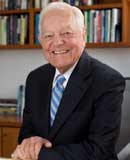Bob Schieffer: The Iowa Caucuses, the New Hampshire Primaries and Beyond

February 3, 2016 — Bob Schieffer, Walter Shorenstein Media and Democracy Fellow, veteran CBS reporter, and former moderator of “Face the Nation,” discussed this week’s Iowa Caucuses, and looked ahead to the upcoming primaries and general election.
Establishment Republicans are beginning to realize that Donald Trump and Ted Cruz can no longer be “laughed off,” said Schieffer, as the results from Iowa made it clear that they stand a chance of securing the nomination. Marco Rubio’s third-place finish has provided a “sense of relief” to the GOP establishment, said Schieffer, adding that he thought it could be a three-man race until the end.
Although Cruz had a “terrific ground game,” and his support runs deep with Tea Party Republicans and Evangelicals, Schieffer questioned how wide his support will be outside of those groups. Anger has played a prominent role in driving voters toward outsider candidates, said Schieffer. Although Trump has not proposed any realistic solutions, he “knows what people are upset about.”
“For a while at least, I still think that Trump is the favorite to get the nomination,” said Schieffer, referencing Trump’s lead in the polls in New Hampshire and South Carolina.
On the Democratic side, Schieffer said that Iowa “was a clear victory” for Bernie Sanders, and he will likely do well in New Hampshire. However, he expects that Sanders will have a much harder time in subsequent states. Clinton has a strong lead in South Carolina, and will likely benefit from the popularity of Bill Clinton among African Americans, especially in southern states, said Schieffer.
Schieffer thinks Clinton will ultimately receive the Democratic nomination, but will face challenges in the general election, which are already starting to surface during the primaries. Schieffer described the Iowa exit polls as very telling: While Clinton had high support among caucus-goers who listed healthcare, the economy, and terrorism as top priorities, and was viewed highly in terms of appropriate experience, Sanders overwhelming won on questions related to honesty and concern about people. Sanders also scores much higher among young people. “She’s missing a big component of what was a winning strategy for Barack Obama,” said Schieffer.
The 2016 race is shaping up to be a different sort of race than previous elections, not only because of the rise of outsider candidates, but also because of changes in demographics and how news and information spreads.
With minority populations growing, Schieffer said that Republicans will be at a disadvantage if they continue to use “anti-immigration” rhetoric. “Anybody who thinks you can write off the fastest growing segment of our population, and thinks that they’re going to win national office is just simply wrong,” he said. Schieffer cited the unexpected election of a Democratic governor, lieutenant governor, and attorney general in Virginia in 2013 due to a large turnout of Asian voters. “Republicans had simply misjudged who the electorate was at that point,” he said.
The impact of political ad spending seems to have been dulled so far during this campaign season, noted Schieffer – something that he views as a positive development, given the large role of money in American politics. “I can’t remember a campaign in my lifetime where political ads didn’t make a big difference,” he said. Jeb Bush raised $115 million through his super PAC and has run ads extensively, yet “it hasn’t made one bit of difference,” said Schieffer.
The barrage of information facing voters now includes social media, in addition to fragmented, traditional media sources. “What we’re seeing [that’s]different this time around… has gone far beyond ‘people who listen only to MSNBC get one set of facts, and people who listen only to Fox get another’ – we now have stuff out there that is just totally wrong and made up, and made up for a reason,” said Schieffer, listing examples of supposed news about candidates that went viral, but turned out to be false.
During the question and answer session, Schieffer also discussed the impact of the race on the Senate, Clinton’s email controversy, media coverage of Trump, Michael Bloomberg’s potential bid, and the questions he would like to ask the presidential candidates. Listen to the full audio recording above.
Article and photo by Nilagia McCoy of the Shorenstein Center.